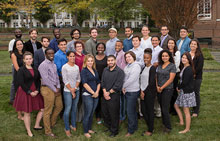Main Content
Looking Forward

The 2015 Gilliam Fellows. Credit: Hadar Goren.
The Howard Hughes Medical Institute’s newly expanded Gilliam Fellowships for Advanced Study Program has awarded 30 fellowships to outstanding students who are pursuing a PhD in the life sciences and who are committed to increasing diversity among scientists.
The awards provide full support to promising students pursuing doctoral degrees in the life sciences. Each fellow will receive an annual award totaling $43,000, which includes a stipend, a training allowance, and an institutional allowance, for up to three years. Previously, HHMI selected between five and nine Gilliam fellows per year.
HHMI expanded the program because it felt there was a large need to encourage more PhD students who are committed to diversity. “Our goal is to support the development of extraordinary students who will become scientific leaders and are committed to diversity in the life sciences,” said HHMI President Robert Tjian. “Diversity drives new ideas, and we need new ideas to help us solve many difficult problems in biomedical research.”
HHMI established the Gilliam Fellowships in 2004 in honor of the late James H. Gilliam, Jr., a charter Trustee of the Institute who spent his life nurturing excellence and diversity in science and education.
“We are excited to be able to expand the program to support the training of a greater number of terrific, young scientists,” said Sean B. Carroll, vice president for science education at HHMI. “We look forward to watching these Gilliam Fellows develop into leading scientists in the years ahead.”
The program’s goal is to ensure that a diverse and highly trained workforce is available to assume leadership roles in science, including college and university faculty who have the responsibility to develop the next generation of scientists. Successful applicants are chosen for their academic excellence, scientific potential, and commitment to the advancement of diversity and inclusion in the sciences.
“Not only will we Fellows increase the amount of diversity in the science workforce, but we will continue to be strong proponents for diversity for the remainder of our scientific careers,” said Simone White, an awardee at Cornell University. “The Gilliam Fellowship will give us the means to obtain our degrees and become diverse leaders in science, so we can continue to promote diversity to the broader scientific community.”
In addition to financial support, fellows also attend meetings with HHMI scientists and receive professional development mentoring as they launch their academic careers.
All of the previous Gilliam fellows were alumni of HHMI’s Exceptional Research Opportunities Program (EXROP), an initiative that provides undergraduate minority students with the opportunity to conduct research under the mentorship of HHMI scientists.
As part of the program’s expansion, HHMI broadened the application pool to include graduate students nominated by the principal investigators of non-MSTP T32 training grants awarded through the National Institute of General Medical Sciences (NIGMS).
A total of 119 students applied for the fellowships this year, including 20 EXROP alumni. The new 2015 Gilliam fellows, their institutions, and advisors are:
| Student | Institution | Advisor |
|---|---|---|
| Adebola Adeniran | Northwestern University | Keith Tyo |
| Biafra Ahanonu | Stanford University | Mark Schnitzer |
| Raymundo Alfaro-Aco | Princeton University | Sabine Petry |
| Jonathan Asfaha | University of California, San Francisco | David Morgan |
| Kwabena Badu-Nkansah | Duke University | Terry Lechler |
| Diego Baptista | Harvard Medical School | Gerhard Wagner |
| Jacob Borrajo | Massachusetts Institute of Technology | Paul Blainey |
| Christopher Craddock | University of Chicago | Jonathan Staley |
| Daniel Ehrens | Johns Hopkins University School of Medicine | Christophe Jouny |
| Kiara Eldred | Johns Hopkins University | Robert Johnston |
| Gabriela Fernandez-Cuervo | University of Arizona | Mark Pagel |
| Phillip Geter | New York University School of Medicine | Robert Schneider |
| Elizabeth Gichana | University of Michigan | Charles Brooks |
| Anastassia Gomez | University of California, San Diego | Navtej Toor |
| Abigail Groff | Harvard University | John Rinn |
| Kevin Hartman | University of California, San Francisco | Ryan Hernandez |
| Keywan Johnson | University of Rochester | Daniel Weix |
| Mitchell Lee | University of Washington School of Medicine | Matt Kaeberlein |
| Anthony Mangan | University of Colorado Denver School of Medicine | Rytis Prekeris |
| Sterling Martin | University of Wisconsin-Madison | Jeff Hardin |
| Temet McMichael | Ohio State University | Jacob Yount |
| Patrick Menzies | University of California, San Diego | JoAnn Trejo |
| Claudio Morales-Perez | University of Texas Southwestern Medical Center | Ryan Hibbs |
| Kwadwo Opoku-Nsiah | University of California, San Francisco | Jason Gestwicki |
| Jessica Perez-Cunningham | University of California, Santa Cruz | Camilla Forsberg |
| Joan Pulupa | Rockefeller University | Sanford Simon |
| Melissa Sandoval | University of California, San Francisco | Daniel Hart |
| Simone White | Cornell University | Mariana Wolfner |
| Katie Yang | University of Wisconsin-Madison | Michelle Ciucci |
| Valerie Zabala | Brown University | Philip Gruppuso |
